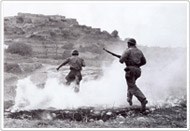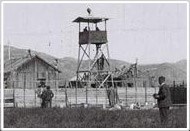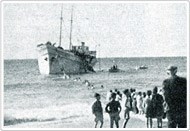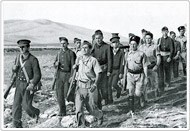
Hagana Defending the Jewish community and resisting the British
 Hagana was founded in 1920 to defend the Jewish community in Palestine against Arab violence. It fought and repelled murderous attacks in 1920,1929 and throughout the Arab rebellion in 1936-1939. In the Second World War Hagana was deployed to fight an eventual German invasion. It also mobilized 30,000 to fight with Britain against the Nazi enemy, and participated in the conquest of Lebanon and Syria. After the war Hagana launched in Palestine a civilian and armed struggle against the British authorities, which blocked immigration of Holocaust survivors and banned new Jewish settlements.
Hagana was founded in 1920 to defend the Jewish community in Palestine against Arab violence. It fought and repelled murderous attacks in 1920,1929 and throughout the Arab rebellion in 1936-1939. In the Second World War Hagana was deployed to fight an eventual German invasion. It also mobilized 30,000 to fight with Britain against the Nazi enemy, and participated in the conquest of Lebanon and Syria. After the war Hagana launched in Palestine a civilian and armed struggle against the British authorities, which blocked immigration of Holocaust survivors and banned new Jewish settlements.
Hagana raises new settlements, which determine the borders
 During the Arab rebellion (1936-1939), Hagana initiated the founding of 52 new settlements, known as Stockade and Tower, and defended them. In a single night in 1946 Hagana set up 11 new settlements in the Negev, which secured the south as part of Israel, and took part in founding and defending many more, despite British denial and Arab armed resistance. These settlements played a major role in defining the borders of the new State of Israel.
During the Arab rebellion (1936-1939), Hagana initiated the founding of 52 new settlements, known as Stockade and Tower, and defended them. In a single night in 1946 Hagana set up 11 new settlements in the Negev, which secured the south as part of Israel, and took part in founding and defending many more, despite British denial and Arab armed resistance. These settlements played a major role in defining the borders of the new State of Israel.
Hagana leading "illegal" Jewish immigration
 Since the early 1930's, Hagana started to smuggle into Palestine Jewish immigrants defying British restrictions. During the War and after, the British blocked immigration, almost entirely. Hagana launched extended operations (Ha’apala), at sea and by land, to rescue thousands who survived the death camps, and to smuggle Jews from Arab States. Many vessels carrying thousands of survivors tried to force the British naval blockade. Some succeeded but many were caught and deported to Cyprus and other countries. Altogether, Hagana brought in over 100,000 Jews, which increased significantly the small Jewish population of 500,000.
Since the early 1930's, Hagana started to smuggle into Palestine Jewish immigrants defying British restrictions. During the War and after, the British blocked immigration, almost entirely. Hagana launched extended operations (Ha’apala), at sea and by land, to rescue thousands who survived the death camps, and to smuggle Jews from Arab States. Many vessels carrying thousands of survivors tried to force the British naval blockade. Some succeeded but many were caught and deported to Cyprus and other countries. Altogether, Hagana brought in over 100,000 Jews, which increased significantly the small Jewish population of 500,000.
Hagana – the armed force of the state in the making
 Despite being an underground illegal organization, Hagana was preparing to become the armed force of the future state: by training corps of commanders and thousands of combatants, formulating original strategies and tactics, incorporating military knowhow of foreign armies. Hagana created unique military formations: Palmach – the only standing field forces, homeguard, youth battalions, air and naval units, signals, intelligence groups and other services, and started manufacturing arms and ammunition. Hagana always operated under the control and direction of the national Jewish authorities. When the War of Independence broke out Hagana became Israel Defense Army (Zahal).
Despite being an underground illegal organization, Hagana was preparing to become the armed force of the future state: by training corps of commanders and thousands of combatants, formulating original strategies and tactics, incorporating military knowhow of foreign armies. Hagana created unique military formations: Palmach – the only standing field forces, homeguard, youth battalions, air and naval units, signals, intelligence groups and other services, and started manufacturing arms and ammunition. Hagana always operated under the control and direction of the national Jewish authorities. When the War of Independence broke out Hagana became Israel Defense Army (Zahal).